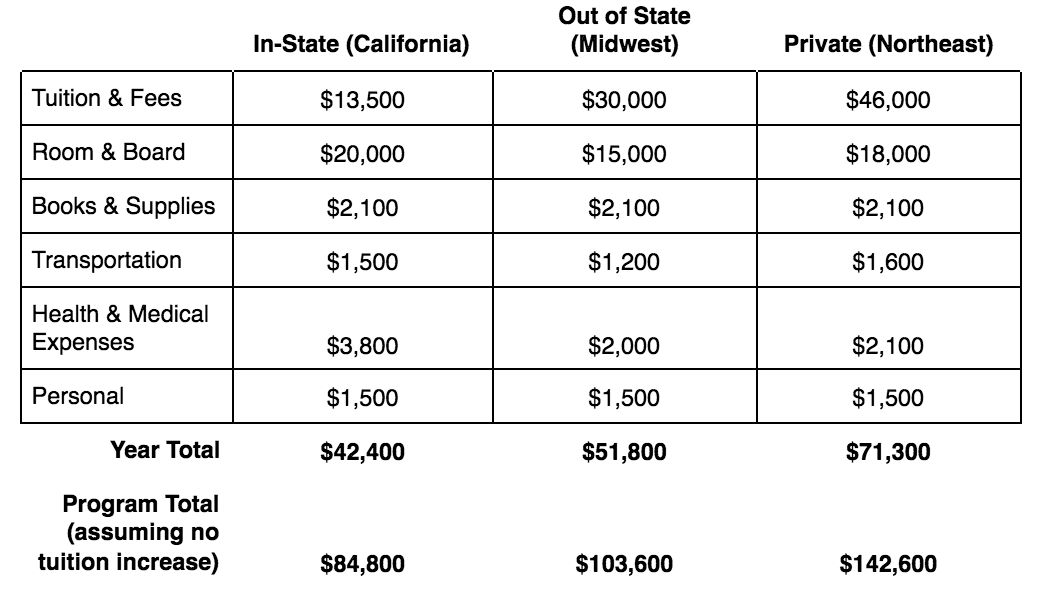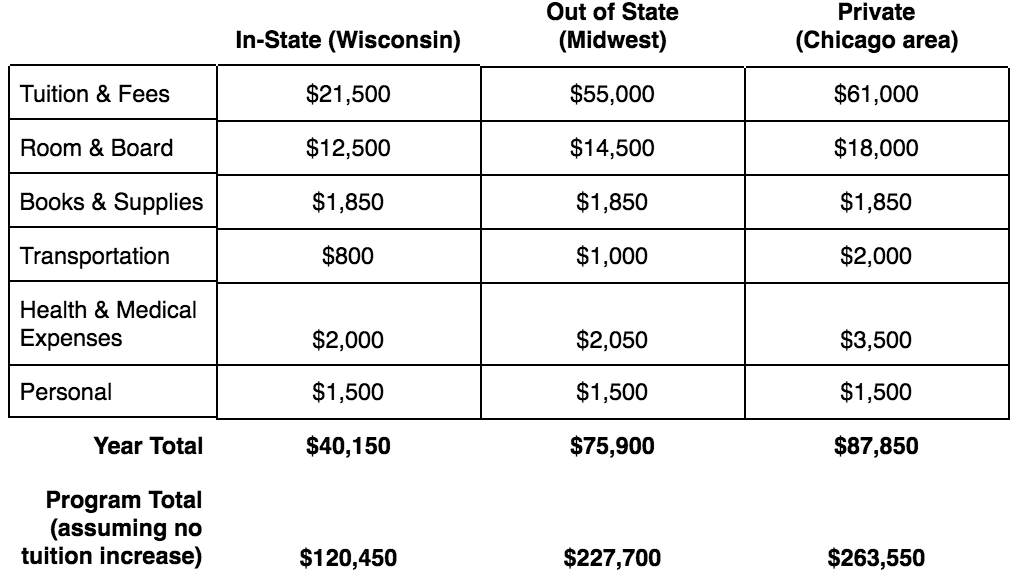Financing Your Graduate School Education
Everyone will specific questions regarding their financial situation and how it impacts the entire application and funding process. This resource provides information to help you project costs and possible methods of funding including loans, school-based aid, PhD specifics, outside funding, fellowships, and scholarships.
Tips from a financial aid professional
Everyone will have specific questions regarding their situation and how it impacts the entire application and funding process. Be sure to look over all available information to make any calls to the financial aid office just a little easier on you. And remember:
- Follow all directions. If the directions and requirements are unclear, ask for help. Failure to meet deadlines and/or supply required documentation may result in reduced funding or failure to receive any funding.
- If you are unsure who or how to ask stop by Career Education and we can figure it out together!
- Your record is your record. Parents, partners, spouses, etc. must be granted access to your academic and financial accounts (generally including payment history, balances, etc.). Requirements for granting access can vary by institution be sure to read their financial aid website.
- Read your funding documents. Be sure to read documentation carefully and thoroughly, you don’t want any surprises. This applies to ALL types of funding not just loans
- You can always review information related to the Free Application for Federal Student Aid (FAFSA). Don’t forget to review some of the recent changes to FAFSA filing.
The College Affordability Guide also has some great information on financing graduate education.
Questions to ask:
- Is a graduate/professional degree the right next step for me, and will it help me to do the work I want to do afterwards? Do I need this degree?
- How much will it cost?
- How might I cover those costs?
- Is this a reasonable investment?
How much will it cost?
This will vary by type of institution (public or private), type of program (clinical, research), and degree type (MEd, PhD, MD, etc.) Below are some examples and definitions to help make sense of the numbers. The total cost of graduate and professional school begins before you even apply.
- Standardized tests & application fees - many programs require at least one standardized test score (GRE, MCAT, LSAT, etc.) in addition to the application fee. Be sure to calculate this into your total cost. Waivers may be available.
- Deposit: A non refundable payment required to hold your place in a program to which you have been accepted.
- PhD funding: duration of funding
- Masters, PhD
- In state, out of state, private
- Total cost
- Tuition & fees
- Cost of living comparison and related questions
- Estimate costs of living
- How does in state work?
- In state, out of state, private
Example 1: MFA Degree
Scenario: Lucia Delgato wants to pursue an MFA in fine arts. She is from California and is considering the University of California system, but she is also interested in comparing top private and state programs across the country. All of the costs below are approximations, and are based off of a 2-year MFA program (some are 2.5 or 3 years). Make sure you know how long your program will take when calculating costs. Housing and transportation costs are averages of estimates from schools in the hypothetical regions and should be taken as reference points, not exact costs. Books and supplies are slightly higher than would be estimated for other Masters programs because of the costliness of art supplies.

Discussion: Comparing the options, in-state tuition is considerably less expensive for Lucia, but the cost of living in California, especially in LA or the Bay Area — where she would prefer to be — is very high. Even though out of state tuition is much higher, the lower cost of living in the Midwest means this option is not prohibitively more expensive than the in-state options. However, private tuition, combined with the higher cost of living in Northeastern cities makes, the Private MFA option considerably more expensive than the two public options.
Examples 2: Law (JD) Degree
Scenario: Jenny Paik plans to go to law school. She is from Wisconsin and is considering the University of Wisconsin's law program to be close to family and save money, but she is also looking at other top programs in the Midwest. Tuition and fee costs are approximations and are for 3-year programs, which is the industry standard. Housing and transportation costs are averages of estimates from universities in the midwest region and should be taken as reference points, not exact costs.

Discussion: In-state tuition would make law school — which is simply expensive — considerably less costly than the out of state and private options. Additionally, Madison, WI is comparatively more affordable than other Midwest cities such as Minneapolis or Chicago, and Jenny could conceivably lower her cost of living even more if she was able to live with family while in school. Both out of state and private tuition are considerably more expensive than the in-state option. When the considerably higher tuition costs of the private law school is combined with the higher cost of living in Chicago, this option ends up being more than double the price of the in-state option. Jenny would likely want to research the possibility of securing merit grants or scholarships to make this option more affordable.
Questions to Consider
When considering these hypothetical scenarios, it becomes clear that the cost of attending graduate school is much more complicated the price tag of tuition alone. Instead, it is crucial that you dig deeper into the associated and even hidden costs by asking yourself questions such as:
- How are you accounting for the cost of living? Can you reduce costs by living with roommates or in campus housing? What are the tradeoffs of living farther away from campus (where housing may be more affordable) but needed to pay more for transportation?
- What types of aid do these programs offer? How would this aid alter the cost equation?
- Some schools allow students to pay in-state tuition rates after a year of residency. Is this a possibility at any of the out of state schools you are considering? If so, how would this alter the cost equation?
- Health insurance costs can vary widely by program. Some programs even cover the cost of health insurance entirely. Also, remember that if you are an American citizen under 26 years old, you can stay on your parents’ health insurance and waive the program insurance fee.
What does it mean?
Below are some of the costs to consider and what they mean.
- Tuition: This is the charge you pay to cover the cost of teaching and instruction. Tuition is usually calculated differently depending on whether you are enrolled full time or part time. Example 1 is a medical school so full time is the only option. If a program offers a part time options you are usually charged at the per-credit rate. (Example 2?)
- Fees: In the US, these are cost for other services not covered by tuition, such as: labs, student activity, technology, health, athletics, etc. Most clinical programs have clinical fees and/or lab fees associated with clinical and lab courses. In some countries, “fees” are what in the US would be called “tuition.”
- Room and board: general living expenses such as the cost of lodging and food. The exact cost can vary greatly by location and whether or not you live on campus.
- Books/Supplies: This can vary greatly by the type of programs. Clinical programs will have a higher cost in this area if specialized equipment (stethoscope, gait belt, blood pressure cuff, etc.) is required for your training.
- Transportation: This will vary by program and location. Public transportation is sometimes included in your student fees.
- Misc.: other costs not covered in the categories above.
- Cost of Attendance: In the US and some other countries, this is calculated each academic year by every institution and provided to the department of education. Important Note: If you receive any US federal funding this will act as the ceiling for total funding that can be received each academic year from all sources.
- Federal Financial Need: Cost of attendance (COA) minus Expected Family Contribution (EFC)
- For more about EFC see StudentAid.ed.gov
- Free Application for Federal Student Aid (FAFSA): this is required for almost all federal funding, some campuses may require submission of a FAFSA to receive certain aid. For more information: https://studentaid.ed.gov
How can I pay?
Be sure to research all of the options available to you for the schools and programs you plan to attend. A great detailed overview can be found HERE. Below are some of the options available to you. Check in with Fellowships and Scholarships and a Career Community Advisor to talk about specific opportunities.
Loans
A brief overview of common US loan types is below be sure to check the Department of Education website for up to date information on direct and graduate plus loans. You can also find helpful resources on US student loans from the Consumer Financial Protection Bureau here.
Direct — Unsubsidized
- Subsidized is no longer an option for graduate students
- Fixed interest rate
- Non-need based
- Must be enrolled at least half time (6 credit hours) in degree program
- Repayment and interest begin 60 days after disbursement
- Repayment deferred when enrolled at least half time
- Generally, automatic consideration when applying for campus aid
- Requires Master Promissory Note and entrance counseling
- 1.069% origination fee
Graduate Plus
- Fixed interest rate
- Non-need based
- May borrow up to the cost of attendance minus other aid
- Must be enrolled at least half time (6 credit hours) in degree program
- Repayment and interest begin 60 days after disbursement
- Repayment may be deferred until after graduation
- Requires FAFSA, Master Promissory Note, and entrance counseling
- Requires credit check
- 4.276% origination fee
Private
- Interest rate varies with loan
- Non-need based
- Most likely will need credit worthy co-signer
- Terms vary by lender
- Application process varies by lender
- Generally, must accept or decline other aid first
- Must be in degree seeking program
School-based aid
This category covers a wide variety of funding sources and opportunities. Be sure to check with each campus and program to find opportunities. A few additional notes:
- Generally, this refers to funds that are only available only to those on that campus, sometimes limited to those in specific programs
- These sources may have separate applications and timelines. Be sure to read information and instructions closely. This information may be sent directly to you by a department, school, or program contact. It may also be available on the financial aid website.
- Not all of these sources will be need-based. There may be very specific requirements such as state of residence, high school attended, etc.
- Graduate assistant (GA) & research assistant (RA) positions:
- Funding for these may come from any number of sources based on the institution and program.
- Duties of the roles can vary but they are primarily designed to help students learn and practice skills that will be valuable during and after their graduate program.
- Some programs provide GA and RA positions as a part of set funding packages, if this is the case specific language should be easy to find.
- Other programs will post opportunities on a job board and require students to apply and be interviewed, similar to any job.
- There should be guidelines on acceptable, and unacceptable, responsibilities for both positions.
PhD Specifics
You may have heard that a PhD should be free, or that someone else should be paying for your doctoral degree. While there may have been some truth to this in the past, funding in higher education has changed dramatically over the last 10-15 years--but there is still more funding available for PhDs than for master’s degrees. See below for some important notes related to funding a doctoral education.
- Funding for doctoral education can vary greatly by academic field, institution, full or part time status.
- Research areas of faculty associated with a department and their related grants will also impact packages available to you.
- Funding packages are created with specific time tables for students in mind. Full funding may only be available during the first few years while you are still taking courses, which are the most expensive.
- Graduate assistant and research assistant positions usually require a minimum number of hours per semester or academic year to earn your stipend.
- Some funding is guaranteed for a set number of years, in other cases it must be renewed year to year. Be sure to read the details for any funding offered.
- Funding beyond your initial aid package may be limited or dependent on your research, publications or other metrics.
Outside Funding
These are funds in you have been awarded and can take with you to the institution you attend. The funding is more closely tied to a discipline, degree type, experience or mission rather than a specific institution.
- US Government Programs (if you’re a citizen of a country other than the US, it’s a good idea to research what might be available from your government: start by looking for information provided by the Ministry of Education or its equivalent)
- Loan forgiveness
- National Health Service Corps Loan Repayment, DCBF Loan Repayment Assistance Program, NIH Loan Repayment Programs, California Dental Association
- Employer benefits: depending on the industry, and employer may pay for some or all of your advanced training. There are usually waiting periods before using these benefits and there may be restrictions based on need in a given field, years of service, etc. May also be referred to as tuition assistance or professional development funds. Be sure to read the find print and talk to your human resources office and hiring manager. A few examples are below.
Fellowships and Scholarships
There are a wide variety of options across multiple disciplines and for citizens of any country. A few great places to start is the Fellowships & Scholarships pages on our website. A few examples are below:
- Soros Fellowship
- Commonwealth Scholarship
- Ford Foundation Fellowships
- Wellesley College Graduate Fellowships
- Don’t miss our advice on searching for scholarships and fellowships for graduate and professional degrees...
Additional Online Resources
General Information:
- Access Group (private, nonprofit lender for individuals pursuing a graduate or professional school degree, special expertise in law school lending)
- FastWeb (scholarship search engine)
- FinAid (nonprofit site with student aid information)
- Gradschools.com (see “Financing” tab)
- The admissions and financial aid process for graduate school (parts 1 and 2) (idealist.org) (video)
- Massachusetts Educational Financing Authority
- National Association of International Educators (NAFSA) (for international students seeking funds for study in the U.S.)
- Wellesley tips for searching for funding for graduate/professional degrees
- ProFellow (Fellowship search engine)
- Scholarships, Fellowships, and Loans - Gale Virtual Reference Library
- U.S. Department of Education Financial Aid Student Guide
- Government information on loans, grants, work-study, and general application policies.
For law and medical school:
- Paying for Law School (LSAC) (video)
- The Economics of Becoming a Doctor (AAMC) (video)
- Association of American Medical Colleges - Financial Aid Facts Sheets
For the sciences:
- American Association for Advancement of Science (AAAS) (funding for training in the sciences—for alumnae)
- Community of Sciences Database (search engine for the sciences; can search by home country, more geared for graduate school)
For study abroad:
- International Financial Aid and College Scholarship Search (IEFA) (financial aid, college scholarship, and grant information for U.S. and international students wishing to study abroad)
- Institute of International Education (IIE) Funding for U.S. Study Online (extensive database of scholarships, fellowships and grants)
- The International Scholarship Search (premier financial aid, college scholarship and international scholarship resource for students wishing to study abroad)
- Pathways to Science
For women only:
- American Association of University Women
- Margaret McNamara Memorial Fund
- PEO International Peace Fellowship
- Wellesley College Graduate Fellowships
For new Americans:







